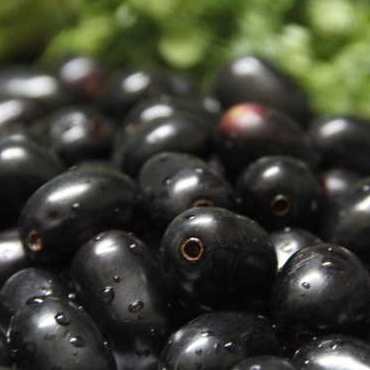
Jamun, Black Berry - Syzygium Cumini
Syzygium Cumini, jambul, jambolan, jamblang, or jamun, is an evergreen tropical tree in the flowering plant family Myrtaceae. Syzygium cumini is native to Bangladesh, India, Nepal, Pakistan, Sri Lanka, Malaysia, the Philippines, and Indonesia. The name of the fruit is sometimes mistranslated as blackberry, which is a different fruit in an unrelated family.
The tree was introduced to Florida, USA in 1911 by the USDA, and is also now commonly grown in Suriname and Trinidad and Tobago. In Brazil, where it was introduced from India during Portuguese colonization, it has dispersed spontaneously in the wild in some places, as its fruits are eagerly sought by various native birds such as thrushes, tanagers and the Great Kiskadee. This species is considered an invasive in Hawaii, USA. It is also illegal to grow, plant or transplant in Sanibel, Florida.
Cumini is also known as jambul/jambhul/jambula/jamboola, Java plum, jamun, jaam/kalojaam, jamblang, jambolan, black plum, Damson plum, Duhat plum, Jambolan plum or Portuguese plum. Malabar plum may also refer to other species of Syzygium. This fruit is called Jamun in [Konkani], Hindi, Urdu and Punjabi, Naaval Pazham in Tamil, Naaval Pazham in Malayalam, Nerale Hannu in Kannada,Neredu Pandu[నెరేడౠపండà±] in Telugu, Kalojam or Jam in Bengali, Jamukoli in Oriya and Jambu in Gujarat. In the Philippines, common names include duhat in the Tagalog-speaking regions, lomboy in the Cebuano-speaking areas, lumboy in Northern Luzon and inobog in Maguindanao. It is called Dhanbu in Maldives and Dhuwet/Juwet in Javanese. Among its names in Portuguese are jamelão, jambo, jambolão, jalão, joão-bolão, manjelão, azeitona-preta, baga-de-freira, brinco-de-viúva and guapê, always with lower case, the early four derived from the Konkani name jambulan. They are called rotra in the Malagasy language (Madagascar). It is called reyang dut or krian dot in Malay especially in the northern part of Malay Peninsula.
Description
A slow growing species, it can reach heights of up to 30 m and can live more than 100 years. Its dense foliage provides shade and is grown just for its ornamental value. At the base of the tree, the bark is rough and dark grey, becoming lighter grey and smoother higher up. The wood is water resistant. Because of this it is used in railway sleepers and to install motors in wells. It is sometimes used to make cheap furniture and village dwellings though it is relatively hard to work on.
The leaves which are an aroma similar to turpentine, are pinkish when young, changing to a leathery, glossy dark green with a yellow midrib as they mature. The leaves are used as food for livestock, as they have good nutritional value.
Syzygium cumini trees start flowering from March to April. The flowers of are fragrant and small, about 5 mm in diameter. The fruits develop by May or June and resemble large berries. The fruit is oblong, ovoid, starts green and turns pink to shining crimson black as it matures. A variant of the tree produces white coloured fruit. The fruit has a combination of sweet, mildly sour and astringent flavour and tends to colour the tongue purple.
The seed is also used in various alternative healing systems like Ayurveda (to control diabetes, for example.), Unani and Chinese medicine for digestive ailments.
The pulp of the fruit, extracts from the bark and seeds is of great benefit when it comes to lowering of blood glucose level. Taking dried extract of the seeds orally, greatly reduces the blood sugar and glucosuria. The leaves and bark are used for controlling blood pressure and gingivitis. Wine and vinegar are also made from the fruit. It has a high source in vitamin A and vitamin C. Syzygium cumini has been spread overseas from India by Indian emigrants and at present is common in former tropical British colonies.
FAQs:
What is the Return Policy?
This product is Not Returnable. It may be replaced or refunded in case of damage or defective condition on a case to case basis.
How to cancel my order?
Cancellation for Live Plants is allowed before the dispatched. You can request cancellation through Your Orders page or by contacting customer service within that time.
What if i received damage product?
If a product is received in a damaged or defective condition, you need to contact the customer service within 1 days of delivery. Free of cost replacement or refund claim is available to you.


